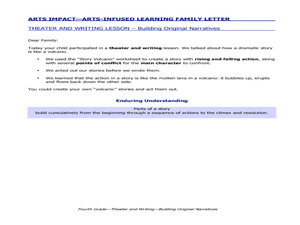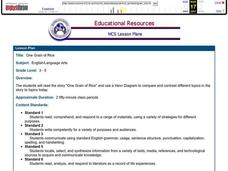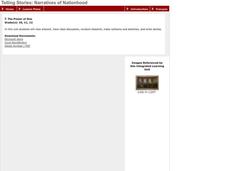Curated OER
Building Original Narratives
Fourth graders act out and write original narratives. In this theater meets writing lesson, 4th graders work in groups to create original narratives; after students act out their story, they write it down as a narrative.
Curated OER
Chicka Chicka Boom Boom
Young readers write alphabet letters. They review the alphabet and examine the relationship between letters and sounds. A final activity has each child sequence the story together.
Curated OER
Scumbelina
This cute and new imagining of the old tale of Cinderella comes complete with a beginning, middle, and end, audio, and comprehension questions. Learners will read along as you progress through each slide, then answer several questions at...
Curated OER
Crater Creation
After looking at the back of a quarter featuring Oregon terrain, learners distinguish between fiction and non-fiction and identify the beginning, middle and end of a story. First, they listen to legends that describe the creation of...
Film English
Two Fingers
Ask your class to think about how song lyrics can go with a video and more with a well-sequenced lesson plan that focuses on the song "Two Fingers" by Jake Bugg. Class members work together to make predictions about the content of the...
Curated OER
Aboriginal Legends
Students listen to and read legends and see that these legends helped the Aboriginals explain their everyday life. Through their stories and legends we find that Aboriginal values, attitudes and cultural identities are shared.
Curated OER
Personal Experience Narratives
Help your middle schoolers identify personal experience narratives in their own lives through telling stories themselves and from family members or other adults. They study personal experience narratives in Swapping Stories and compare...
Curated OER
Maus: Making a Visual Representation
How do you represent a tragic event? Are stories of tragic events better left untold? After reading chapter two of Maus and studying other representations of the Holocaust (suggestions are included), class members create a representation...
Curated OER
Moby Dick Puppetry
Such an ambitious lesson! Third graders with special needs listen to an audio recording of the novel, Moby Dick. They stop often to discuss each of the main characters and analyze their actions in the story. They then make puppets of one...
Curated OER
Narrative Writing vs. Explanatory Writing
The class discusses the different purposes an author has for writing. The focus of the discussion is on writing to tell a true story and writing to give information about a specific topic. There are writing purpose sorting cards embedded...
Curated OER
“THE LORAX” by Dr. Seuss
Few children's books convey the message of conservation as well as Dr. Seuss' The Lorax. Read the story aloud, emphasizing the interconnectedness of plants and animals in an ecosystem and discussing different ways people can help the...
Curated OER
Playground Mapping
Students convert their physical models of a playground from a previous lesson into a map of the playground that includes a scale and key. They examine and discuss examples of maps, view an image to map photo essay, and create a map using...
Curated OER
Flip and Flop: An Adaptation Through Dancing Echoes with Shapes and Locomotor Movement
Dancers practice echoing through dance. They listen to a story "Flip and Flop" and then are put into pairs. One partner is Flip, while the other is Flop. Flip creates a shape by dancing, and Flop, the other student, echoes that shape by...
Curated OER
Finding the Main Idea
The carnival is in town! After reading a short excerpt about a day at the carnival, learners use details to determine the story's main idea. They must differentiate the details from the big picture, as there are multiple options they can...
Curated OER
Text Structure Booklet
Middle schoolers work on comparing and contrasting different text structures with this project. First, they study an example of a sample page in a booklet, which they go on to use as a model. They complete a booklet with text structure,...
West Virginia Department of Education
Harpers Ferry Letters
Scholars write letters as if they were someone who heard the story of John Brown's raid. The resource, a standalone, covers information from primary sources that is important to West Virginian history: the Harpers Ferry Letters.
Curated OER
Text Structure: Organizational Patterns
Explore plot structure by analyzing text samples with writers. They define terms such as problem and solution, cause and effect, and story arc. They also identify the sequences used in modern stories by reading samples and determining...
Curated OER
Amos and Boris: Text Study
Twenty insightful questions follow a read aloud of the story, Amos and Boris by William Steig. Scholars then show what they know through completion of a cause and effect chart, reading fluency assessment, and a written explanatory or...
Curated OER
One Grain of Rice
Upper graders read the story One Grain of Rice, and use a Venn diagram to compare and contrast topics found in the story to current event topics today. Groups of three learners work together to create their diagram. The topics they must...
Curated OER
The Power of One
High schoolers examine the origins of the Canadian nation and government. They study the principles upon which each of the provinces was founded. The four-lesson sequence also provides opportunities for experiences in visual art, story...
Curated OER
2nd Grade - Act. 04: What Time Is It?
How do you teach time? Using various stories, 2nd graders will learn about the concept of a daily schedule to develop a sense of self. They will complete a time of day chart and learn about the basic concepts of time beyond a minute....
Curated OER
In Touch with Apples
Students read "How To Make an Apple Pie and See the World", the story of a girl who traveled the world to find the ingredients to make her apple pie. They conduct a series of interdisciplinary activities including testing their senses,...
Curated OER
Go To Sleep, Gecko!
Second graders examine the interdependence of organisms using the book "Go To Sleep, Gecko!" They examine a variety of food chains, listen to the book, and answer story comprehension questions. Students then conduct research on food...
Curated OER
Flying Freudian Fun: A Look At Ethical Decision Making
There are not many more apt examples of ethics gone awry than William Golding's Lord of the Flies.. Ninth graders focus the ethics of decision making with the examples provided in the plot. They focus on the concept of the psyche and how...
Other popular searches
- Sequencing Stories Grade 1
- 3 5 Sequencing Stories
- Fall Sequencing Stories
- Sequencing Stories Grade 4
- Sequencing Stories Grade 2

























